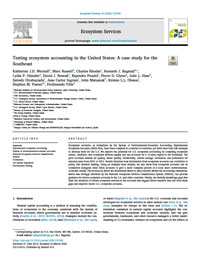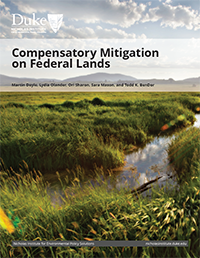Publications
Life Cycle Assessment and Carbon Offset Potential for Cultured Milk Protein
This paper focused on answering the questions: (1) How does the environmental footprint of cultured milk protein compare to that of traditional milk protein (derived from cows)? and (2) If there is a significant difference in greenhouse gas (GHG) emissions between production of cultured and traditional milk protein, would developing carbon credits for cultured protein production be profitable for cultured protein producers?
Exploring the Use of Ecosystem Services Conceptual Models to Account for the Benefits of Public Lands: An Example from National Forest Planning in the United States
A shared understanding of the benefits and tradeoffs to people from alternative land management strategies is critical to successful decision-making for managing public lands and fostering shared stewardship. This study describes an approach for identifying and monitoring the types of resource benefits and tradeoffs considered in National Forest planning in the United States under the 2012 Planning Rule and demonstrates the use of tools for conceptualizing the production of ecosystem services and benefits from alternative land management strategies.
A Practice-Oriented Approach to Foster Private Landowner Participation in Ecosystem Service Conservation and Restoration at a Landscape Scale
Large landscape conservation planning often requires managers to coordinate with private landowners, especially in regions like the southern and western U.S. where private landownership dominates. It is often difficult to design conservation programs that incorporate varying landowner perceptions, values, and ownership objectives. Simple and transferable methods are needed to inform the design of landscape-scale conservation and restoration programs, and we propose that this can be done by targeting ecosystem services (ES) of interest to private landowners.
Graphical Models and the Challenge of Evidence-Based Practice in Development and Sustainability
In development and sustainability, evidence spans disciplines and methodological traditions and is often inconclusive. Graphical models are widely promoted to organize interdisciplinary evidence and improve decision-making by considering mediating variables. However, the reproducibility, objectivity and benefits for decision-making of graphical models have not been studied. In this paper, the authors evaluate these considerations in the setting of energy services in the developing world, a contemporary development and sustainability imperative.
Testing Ecosystem Accounting in the United States: A Case Study for the Southeast
Ecosystem accounts, as formalized by the System of Environmental-Economic Accounting Experimental Ecosystem Accounts (SEEA EEA), have been compiled in a number of countries, yet there have been few attempts to develop them for the U.S. We explore the potential for U.S. ecosystem accounting by compiling ecosystem extent, condition, and ecosystem services supply and use accounts for a 10-state region in the Southeast. The pilot accounts address air quality, water quality, biodiversity, carbon storage, recreation, and pollination for selected years from 2001 to 2015.
USFS Predictive Model Library: Fire and Timber Management
This project explores how these non-USFS models could be combined with existing USFS models to provide a fuller analysis of ecosystem services outcomes from different management scenarios. We used an ecosystem service conceptual model as a framework to examine the utility of currently available predictive models for quantifying the effects of fire and timber management on ecosystem services and socioeconomic outcomes.
Compensatory Mitigation on Federal Lands
This report represents an examination of compensatory mitigation of aquatic resources (i.e., streams and wetlands) on U.S. federal lands through an examination of case studies and a review of the legal landscape in which such mitigation takes place.
GEMS Phase I Report: Oyster Reef Restoration
The GEMS (Gulf of Mexico Ecosystem Service Logic Models and Socio-Economic Indicators) team will develop ESLMs and metrics for a wide range of coastal restoration approaches over the course of the project. This report presents the results of the first phase of the GEMS project, which focused on oyster reef restoration.
Aligning Evidence Generation and Use Across Health, Development, and Environment
Although health, development, and environment challenges are interconnected, evidence remains fractured across sectors due to methodological and conceptual differences in research and practice. Aligned methods are needed to support Sustainable Development Goal advances and similar agendas. The Bridge Collaborative, an emergent research-practice collaboration, presents principles and recommendations that help harmonize methods for evidence generation and use.
Bigger Change Faster
This report, co-authored by the Bridge Collaborative and UNDP, highlights three global challenges that require cross-sector solutions, and actions that can be taken now to drive bigger change faster for people and the world we share.










